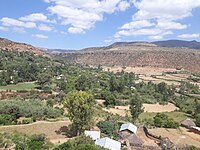Environmental effects of irrigation

When we want to grow plants, we need water. Sometimes, we don't have enough rain to make the plants grow, so we use a thing called irrigation. This means we use pipes or sprayers to give the plants the water they need.
But irrigation can also have an effect on the environment around us. When we take water from a river or lake to use for irrigation, it can cause less water to be left behind for animals and other plants to use. This can cause problems for the ecosystem.
Sometimes, when we use irrigation, the water can evaporate a lot before it even gets to the plants. This means that we need to use more water to make sure the plants get what they need. This can waste a lot of water and can cause less water to be available for people to drink or use.
When we use more water than we need for irrigation, it can also cause the ground to become salty. This happens when the extra water carries salt with it and keeps depositing it on the ground over time. This can make it hard for plants to grow and can harm the soil.
So, while irrigation is a good way to help plants grow, we need to be careful about how we use it and make sure we don't harm the environment around us. We need to use water in a smart way so that there's enough for all the things that need it.
But irrigation can also have an effect on the environment around us. When we take water from a river or lake to use for irrigation, it can cause less water to be left behind for animals and other plants to use. This can cause problems for the ecosystem.
Sometimes, when we use irrigation, the water can evaporate a lot before it even gets to the plants. This means that we need to use more water to make sure the plants get what they need. This can waste a lot of water and can cause less water to be available for people to drink or use.
When we use more water than we need for irrigation, it can also cause the ground to become salty. This happens when the extra water carries salt with it and keeps depositing it on the ground over time. This can make it hard for plants to grow and can harm the soil.
So, while irrigation is a good way to help plants grow, we need to be careful about how we use it and make sure we don't harm the environment around us. We need to use water in a smart way so that there's enough for all the things that need it.
Related topics others have asked about:
